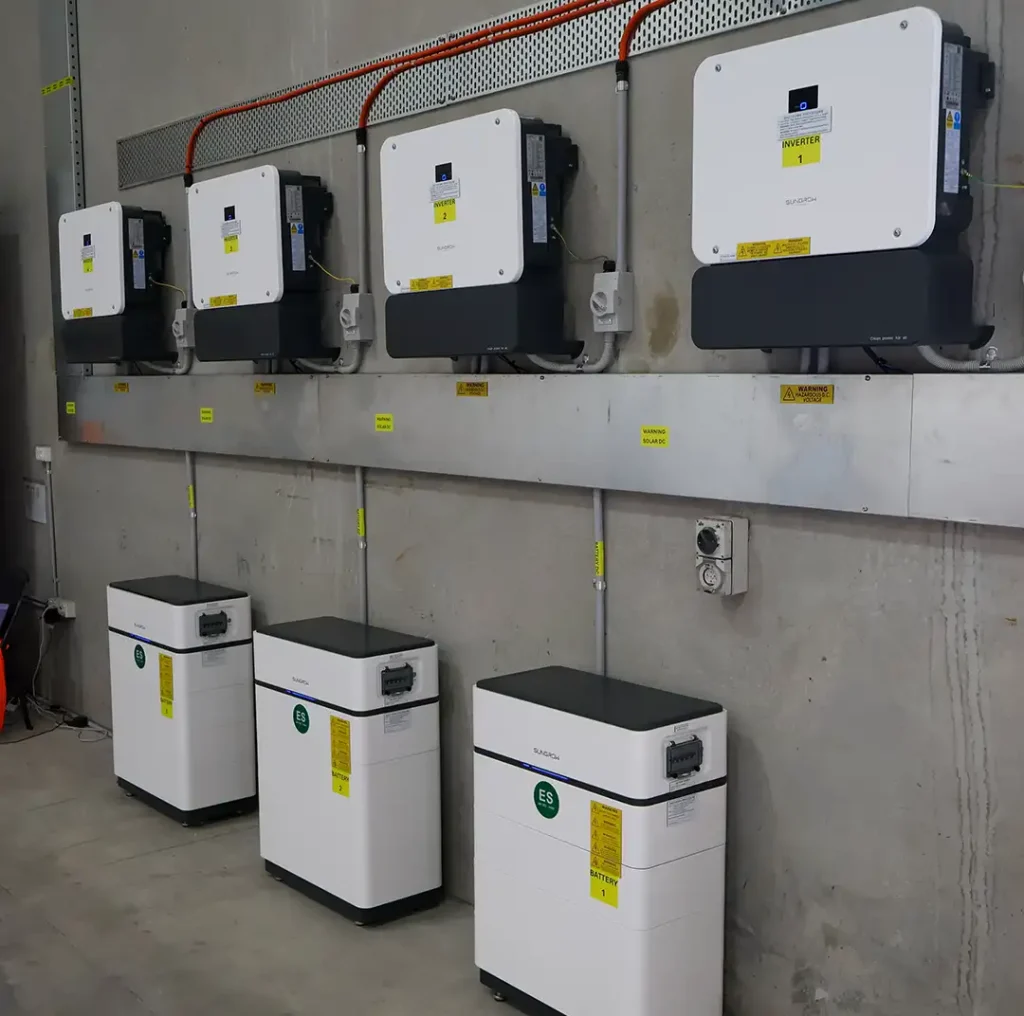
More businesses across the Central Coast are turning to commercial solar systems to ease the pressure of rising electricity costs — but the big question we’re hearing lately is: should you add a solar battery to your commercial system?
The short answer? It depends on how and when you use your energy. But for many local businesses, adding battery storage can unlock serious savings and better energy control.
Let’s look at the facts and help you figure out if battery storage is worth it for your setup.
What Does a Commercial Solar Battery Actually Do?
Solar panels generate electricity during daylight hours — but what happens after the sun goes down?
Commercial solar batteries store your excess solar power so you can use it later in the day or during peak tariff periods. Instead of sending it to the grid for a low feed-in tariff, you’re using it on-site — where the savings are far greater.
Average Cost of Commercial Battery Storage (2025)
Battery prices have come down, but they’re still a significant part of a solar upgrade. Here’s what you can expect to pay:
| Battery Size (Usable kWh) | Estimated Installed Cost |
|---|---|
| 30 kWh | $25,000 – $35,000 |
| 50 kWh | $40,000 – $60,000 |
| 100+ kWh | $80,000 – $120,000+ |
What Are the Key Benefits for Central Coast Businesses?
Adding battery storage to your commercial solar system can deliver far more than just savings on your electricity bill. For businesses operating across the Central Coast — from hospitality in Terrigal to manufacturing in Somersby — a solar battery can unlock greater stability, control, and long-term value.
Here’s how:
1. Slash Peak Demand Charges
Many Central Coast businesses are billed not just for how much power they use, but when they use it. If your peak energy usage occurs during the late afternoon or evening (typically between 4pm–9pm), you’re likely paying higher demand charges.
With battery storage, you can:
- Store solar energy generated during the day
- Discharge it during peak periods
- Avoid costly demand spikes and reduce your overall network charges
2. Maximise Your Solar Self-Consumption
Without a battery, excess solar energy gets exported back to the grid — often for just 5–10 cents per kWh. Meanwhile, you buy that same power back later in the day for 30–45 cents per kWh.
By storing that energy on-site, you:
- Use more of your own power
- Reduce reliance on the grid
- Increase the return on your solar investment
This is particularly beneficial for businesses with early morning or evening operations, like gyms, childcare centres, and food prep businesses.
3. Improve Business Resilience
Blackouts and power outages are more than just an inconvenience — they can disrupt operations, spoil stock, or even put lives at risk in medical settings.
Commercial batteries offer:
- Backup power during outages, keeping essential equipment running
- A seamless transition between grid and battery power
- Peace of mind for businesses that can’t afford downtime
For businesses in rural or fringe-grid areas of the Central Coast — like Jilliby, Mangrove Mountain or Matcham — this reliability can be a critical operational advantage.
4. Greater Control Over Your Energy Costs
With electricity prices fluctuating and network charges getting more complex, many Central Coast businesses are looking for more predictability in their power bills.
Battery storage helps by:
- Flattening usage spikes
- Reducing grid reliance
- Making time-of-use tariffs work in your favour
Combined with a smart energy management system, a solar + battery setup gives you real-time data on consumption, savings, and performance — helping you make informed decisions and plan ahead.
Bonus Benefit: Positioning Your Business for the Future
While you might be focused on cost today, adding battery storage also positions your business as forward-thinking and future-ready. As Virtual Power Plants (VPPs), dynamic tariffs, and energy trading become more mainstream, your battery could become an active asset that earns revenue — not just cuts costs.
When Is Battery Storage Worth It?
Battery storage makes the most sense for Central Coast businesses that:
- Operate into the evening (e.g. restaurants, gyms, healthcare)
- Face high demand charges from Ausgrid or Essential Energy
- Want protection against blackouts or grid unreliability
- Use more than 30% of their total energy after 3pm
Should You Retrofit a Battery or Install It With Solar?
It’s generally more cost-effective to install a battery at the same time as your solar system, as you save on labour and can use a hybrid inverter.
However, if you already have a large system installed, retrofitting a battery is still possible — especially if you’re wasting solar exports or dealing with high evening usage.
What System Do Central Coast Businesses Usually Choose?
- Tradies, clinics, and offices often start with 30kW systems to reduce day-to-day overheads.
- Warehouses and schools go for 100kW systems, striking a balance between cost and coverage.
- Food manufacturers, logistics, and agri-operations tend to go straight for 250kW+ systems to handle their large loads.
Final Word: Is Commercial Battery Storage Worth It?
If your Central Coast business uses a decent chunk of power in the afternoon or evening, battery storage can deliver real value — especially with rebates now available.
While it won’t suit every business, those with the right usage profile can reduce peak bills, avoid demand charges, and gain control over rising energy costs.